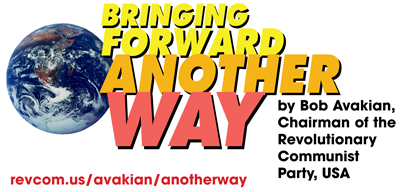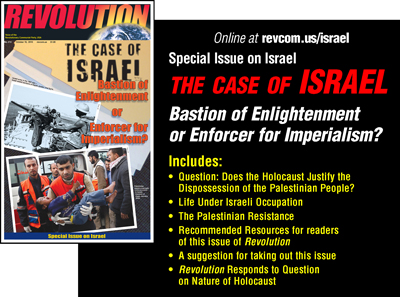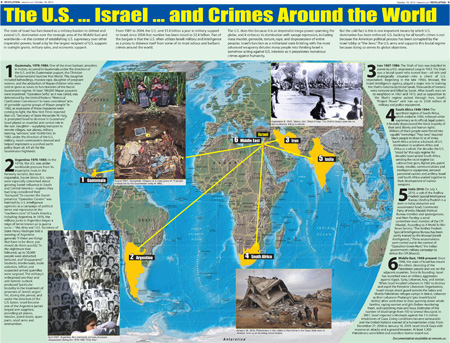Israel and Apartheid: It's not a "Branding" Problem—It's Reality
By Alan Goodman | February 17, 2014 | Revolution Newspaper | revcom.us
In a recent Opinion piece in the New York Times, Hirsh Goodman writes:
ON Feb. 4, 1965, as a teenager, I left South Africa, the country of my birth, for a new home in a place I'd never been—Israel.
I loved South Africa, but I loathed the apartheid system. In Israel, I saw a fresh start for a people rising from the ashes of the Holocaust, a place of light and justice, as opposed to the darkness and oppression of apartheid South Africa.
Now, almost 50 years later, after decades of arguing that Israel is not an apartheid state and that it's a calumny and a lie to say so, I sense that we may be well down the road to being seen as one. That's because, in this day and age, brands are more powerful than truth and, inexplicably, blindly, Israel is letting itself be branded an apartheid state—and even encouraging it. ("Losing the Propaganda War," January 31, 2014).
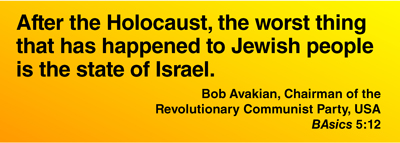
Hirsh Goodman is responding to growing outrage at the way Israel's oppression of the Palestinian people is associated with the terrible crimes of the apartheid regime in South Africa. Many other defenders of Israel, including recently in statements by Vice President Joe Biden, are sounding alarms that Israel is perceived very widely as an apartheid state.
They are reacting to, among other things the growth of a worldwide movement for Boycott, Divestment, Sanctions which has achieved important successes in exposing and opposing Israel's oppression of the Palestinian people.1
What Was Apartheid in South Africa?
Under apartheid, black (and other non-white) South Africans were locked down in prison-like "Bantustans," without the most basic necessities of life (like clean water or decent shelter). They were treated as non-humans, subject to fascist "pass laws" that governed their every movement if they left.
On the backs of their labor, white settlers lived the lifestyles of northern Europeans and global capitalism-imperialism accumulated massive profits. And apartheid South Africa served as a military enforcer for the interests of the U.S. empire in southern Africa, particularly in the "cold war" era, backing massive terrorist operations against and invasions of neighboring countries. (For an understanding of apartheid South Africa, where it came from, what it represented, why and how it fell, and the current state of affairs in South Africa, see "The Legacy of Nelson Mandela and the ANC's Non-Revolutionary Road" from A World to Win News Service at revcom.us).
But Hirsh Goodman claims that the growing association of those crimes with Israel's oppression of the Palestinian people is wrong. That this is a product of Israeli policies that he insists are at odds with the fundamental nature of Israel. And he blames forces who oppose Israel's "occupation of Palestinians' land and, in some cases, Israel's right to exist as a Jewish state," and who Hirsh sees as striving for the "delegitimization" of Israel.
Hirsh Goodman argues that in apartheid South Africa:
"Masses of black people were forcibly moved from tribal lands to arid Bantustans in the middle of nowhere. A 'pass system' stipulated where blacks could live and work, splitting families and breaking down social structures, to provide cheap labor for the mines and white-owned businesses, and a plentiful pool of domestic servants for the white minority. Those found in violation were arrested, usually lashed, and sentenced to stints of hard labor for a few shillings per prisoner per day, payable to the prison service.
"None of this even remotely exists in Israel or the occupied territories."
Yes it does.
This is not a matter of branding. ALL of the things Hirsh Goodman denies exist do exist—as the BASIS for the state of Israel. And as crimes that are happening EVERY DAY throughout occupied Palestine.
Basic Facts on Israel
Here is the basic reality underlying the place Hirsh Goodman describes as "a place of light and justice."
Zionism—a movement for a Jewish State in Palestine—emerged as a movement among Jewish people in Europe in the late 1800s. The movement was one response to the persecution of the Jewish people by the capitalist ruling classes and other reactionary forces in Europe, and it was in opposition to other movements with wide appeal among Jewish people that opposed oppression in unity with other oppressed and exploited people in the places they lived. Zionism got traction with the sponsorship of European imperialist powers that saw it as an opportunity to establish a colonial outpost in the Middle East.
Israel is portrayed as "a land without a people for a people without a land." That is only the case if one considers that Palestinian people not to be human. In 1880, 24,000 Jews lived in Palestine among 450,000 Palestinians. Palestinians owned and farmed virtually all the land. By 1922, several decades of Zionist-sponsored Jewish immigration from Europe had only raised that percentage to about 11 percent.
The Nakba (an Arabic word for "catastrophe"), in 1948, "cleared the ground" literally for the establishment of the state of Israel. This was wave after wave of violent Zionist terror concentrated in the year 1948. One million Palestinians were brutally forced from their land, villages and homes, fleeing with only the possessions they could carry. Many were raped, tortured and killed. To ensure that there would be nothing for the Palestinians to return to, their villages and even many olive and orange trees were thoroughly destroyed. When the Nakba ended, there had been 31 documented massacres—and probably others.2
And rather than being any kind of place of "light and justice," Israel has been a violent enforcer of the interests of U.S. imperialism in the Middle East, and around the world. Israel developed and maintains a substantial nuclear arsenal with which it holds the entire region hostage. Israel has invaded neighboring countries and carried out terrible crimes around the world in service of the U.S. empire—including a significant role in the genocide of 200,000 Guatemalan indigenous people in the early 1980s, and major military backing for apartheid South Africa. (See "The U.S. ... Israel ... and Crimes Around the World" at revcom.us).
Bantustans, Pass Laws, and Palestine...
Today, the areas which the Palestinian people are confined to are every bit as oppressive as apartheid South Africa's Bantustans.

An aerial view of part of Israel's 8-meter-tall cement Apartheid Wall (see accompanying map). This part divides the Palestinian village of Abu Dis. Photo: AP
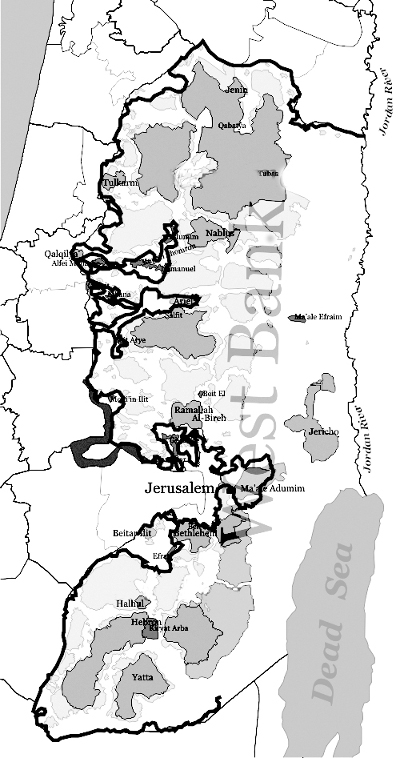
Israel's Apartheid Wall zigzags through hundreds of miles of Palestinian territory—expanding the area seized by Israel and making life untenable for 2.5 million Palestinians on the West Bank.
A towering wall—known to all as the "Apartheid Wall"—zigzags through populated areas of the West Bank where Palestinians still struggle to survive. It divides farmers from their fields. It cuts off towns from each other, requiring Palestinians to be subjected to degrading and potentially lethal detention and interrogation to travel from town to town.
The two million people in Gaza are literally confined in prison conditions, unable to leave, even to visit family in other parts of Palestine. They can see the homes they and their parents and grandparents were driven from on Google Maps, but they can't visit them. They can't see who is living in homes they were driven from. If they venture near the heavily armed walls that keep them locked into Gaza, they will be fired on by Israeli soldiers.
All this is undeniably similar to apartheid South Africa's pass laws—if anything, worse.
Gaza has a coast on the Mediterranean Sea, but the Palestinian people are unable to fish in the sea—which is patrolled by Israeli gunboats. Gaza has farmable land, but farmers who try to harvest crops too near the border with Israel are shot at by Israeli soldiers. Every bit of food, building material, medicine, and anything else that gets into Gaza is filtered by Israeli border guards to provide just enough calories for people to live, and the UN has reported food supplies in Gaza equivalent to those among the poorest families in sub-Saharan Africa, with half the families surviving on one meal a day.
Again, this is not about "branding." It's the truth. Israel is akin to apartheid-era South Africa—and its oppression of the Palestinian people is a particularly egregious crime in a world of raging injustices and oppression.
"Settlement Housing" in the "Occupied Territories"
As part of his argument that the association of Israel with apartheid South Africa is just an issue of "branding," Hirsh Goodman writes:
"Unfortunately, Israel is doing almost everything it can to help its opponents achieve their goal. Instead of focusing on peace talks, Israel continuously signals its intention to build more settlement housing, most recently on Jan. 10, when plans for 1,400 new homes in East Jerusalem and the West Bank were announced."
Here's the basic background to this so-called "settlement housing":
The Palestinian nation is currently divided into three entities—1) Israel 2) what are referred to as the "occupied territories" and 3) areas nominally administered by the Palestine Authority.
The bulk of Palestine, including the best land, most of the access to the Mediterranean Sea and the largest cities was seized by Israel through ethnic cleansing and war in 1948. After 1948, the UN (unjustly) drew boundaries based on that ethnic cleansing and war, recognizing a state of Israel and setting aside the remainder of Palestine for the Palestinians. These 1948 boundaries are the formal, "internationally recognized" borders of Israel. And this ongoing crime is enforced by one of the most powerful militaries in the world, and by daily terror against the displaced Palestinian people (see sidebar "Kidnapping and Torturing Children with Self-Righteousness").
As a result of wars since 1948, Israel militarily occupies much of the area designated as Palestine by the UN. These areas—still populated by Palestinian people—include the eastern part of the city of Jerusalem and much of the West Bank of the Jordan River (the western-most section of Palestine). These areas are referred to as the "occupied territories" and Israeli occupation of them is illegal under all international mandates and agreements.
Since 1993, small, disconnected sections of the West Bank and Gaza have been administered by different factions of the Palestine Authority. The Palestine Authority has no real authority. It is not allowed to maintain an army or defend the borders of the area it administers from constant Israeli military encroachment, and is not recognized as a state by Israel.
The government of Israel has repeatedly expanded what it calls "settlements" in the "occupied territories" in the West Bank. These "settlements" are armed outposts of highly armed, fanatical Zionists who spread terror among the Palestinian residents of the "occupied territories."
What Hirsh Goldman blithely calls "settlement housing," and condemns only as bad PR on the part of Israel, is an ongoing escalation of the ethnic cleaning of the Palestinian people from their homeland. And a statement to the world that there are no rights of the Palestinian people and no international legal mandates that Israel is bound to respect.
What's Legitimate About This?
If, in fact, apartheid South Africa was illegitimate, then what makes Israel—a nation torn from the Palestinian people through ethnic cleansing and terror, and a regional and global hit-man for the U.S. empire—legitimate?
Defenders of Israel (including Barack Obama) invoke the Holocaust as their "bottom line" argument.
But the lesson of that terrible crime—the genocidal killing of millions of Jews (and others) by German imperialism and other reactionary forces in Europe in World War II—should be that this kind of horror should never be repeated anywhere, ever again. That people cannot stand by in silence or passivity when such crimes are being prepared or carried out. That understanding—which does reflect the real lesson of the Holocaust, argues for standing with the Palestinian people against their oppression by Israel. More than a few Jewish people, including Holocaust survivors, have taken that stand.
Defenders of Israel, on the other hand, invoke the Holocaust to argue that any crime is justifiable if it means defending "my people" under any circumstances. That because of the terrible crimes committed by German imperialism and other reactionary forces in Europe against the Jews and others—whatever Israel does is justified. (for a full exploration of the nature of the Holocaust see "Revolution Responds to Question on Nature of Holocaust" at revcom.us) That is a morality that serves a world of oppression and exploitation, the grinding up of billions facilitated by setting sections of people against each other. Invoking the Holocaust does not legitimize the state of Israel, it is a further exposure of its illegitimacy.
* * *
Comparisons of Israel today to apartheid South Africa are simply accurate. The growing "delegitimization" of Israel in people's understanding is most fundamentally rooted in the fundamental illegitimacy of a state built on terrorist ethnic cleansing and serving as a global enforcer for a world of exploitation and oppression.
1. The aims of BDS are summarized at the website bdsmovement.net: "In 2005, Palestinian civil society issued a call for a campaign of boycotts, divestment and sanctions (BDS) against Israel until it complies with international law and Palestinian rights." In December, 2013, the American Studies Association voted to endorse an academic boycott of Israel. The Association for Asian-American Studies has also taken this stand. Courageous, important stands like this have shined a spotlight on Israel's oppression of the Palestinian people and contributed to exposing and isolating Israel. And important institutions and organizations around the world have endorsed B.D.S. [back]
2. Ilan Pappe's book The Ethnic Cleansing of Palestine makes a carefully documented indictment that the dispossession of the Palestinian people meets the legal definition of ethnic cleansing, and that it was the conscious plan of key Zionist leaders. The book draws on primary sources from the Israeli military archives, including the diary of David Ben-Gurion who played a key political and military role in the founding of Israel. [back]
3. "The U.S. ... Israel ... and Crimes Around the World" (Revolution #214, October 10, 2010)
Volunteers Needed... for revcom.us and Revolution
If you like this article, subscribe, donate to and sustain Revolution newspaper.

